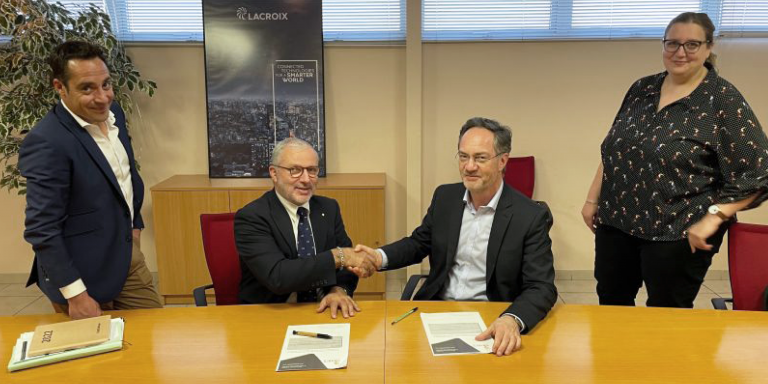
At the beginning of April, during the AI Festival in Cannes, Nevers Agglomeration and the LACROIX group signed an experimentation project focused on innovation and artificial intelligence dedicated to water networks. This agreement, which is part of the development strategy of an intelligent territory at the service of the users of Nevers Agglomeration, will make it possible to anticipate the incidents of the water network and thus to reduce the losses of water thanks to AI.
Nevers Agglomération, which includes 13 municipalities in the Nièvre region and 85,000 inhabitants, aims to meet the challenges of ecological transition, attractiveness and employment, by investing particularly in the fields of digital technology and new technologies. It has also initiated the International Summit on Innovation in Medieval Cities (SIIViM) with the city of Shawinigan, which is organized alternately in Nevers and in this Quebec city. Smart Water is one of its priorities.
Partnership with the Lacroix Group
In 2014, the community signed an initial agreement with the Lacroix company, allowing it to use its SOFREL PCWin2 software to manage its 360km of water networks. This supervision solution allows the centralization and control of data obtained by dataloggers (data loggers) to remotely pilot the performance of water networks.
5,000 pieces of data collected each day are sent to the servers, managed by the PCWin2 intranet supervision system and can be queried on PCs as well as on phones and tablets. As a result, 200,000 m3 have been saved each year thanks to this first partnership.
Exploiting even more data
Nevers Agglomération now wants to go further with AI to anticipate possible incidents on the network and react quickly when abnormal consumption is observed.
It therefore turned to the LACROIX Innovation Lab to add its mapping and billing databases to those of PCWin2. Consumption anomalies are detected, the sector is determined and, by crossing the billing database with real-time data, the leak is identified.
Denis Thuriot, Mayor of Nevers and President of Nevers Agglomeration, states:
“I am committed to making Nevers Agglomeration an example in terms of smart cities. Our objective, by investing in high-performance technologies, is to provide an efficient and reliable service to our fellow citizens in order to improve their daily lives. The innovation promoted through this prototype of the LACROIX Innovation Lab meets all our performance, sustainability and environmental challenges.
Fabrice PACCAMICCIO, head of the Nevers Agglomeration water authority, adds:
“Thanks to this system, our teams will now be able to react in real time to any anomaly. They will be able to implement a preventive intervention, which could avoid a technical breakdown with serious consequences, both functional and financial.
Preserving water resources
Fresh water is a rare commodity, yet the need for it is growing, whether for agriculture, which is a major consumer, or for industry or domestic use. However, in France, more than a quarter of drinking water is lost during its transport in the networks. Optimizing operating networks to reduce this loss is a crucial issue for local authorities and consumption costs are the two main objectives of this agreement.
Stéphane Gervais-Ducouret, Executive VP Strategic Innovation & Smart Data at LACROIX, states:
“Thanks to the experimentation set up for Nevers Agglomeration, we want to develop an AI offer dedicated to water networks and adapted to each city and territory, in terms of deployments and costs. Within LACROIX, the innovation team and the design office work in close collaboration, which allows us to be ever more ambitious in the innovations we propose.”
Translated from Nevers Agglomération optimise l’exploitation de ses réseaux d’eau potable grâce à l’intelligence artificielle









